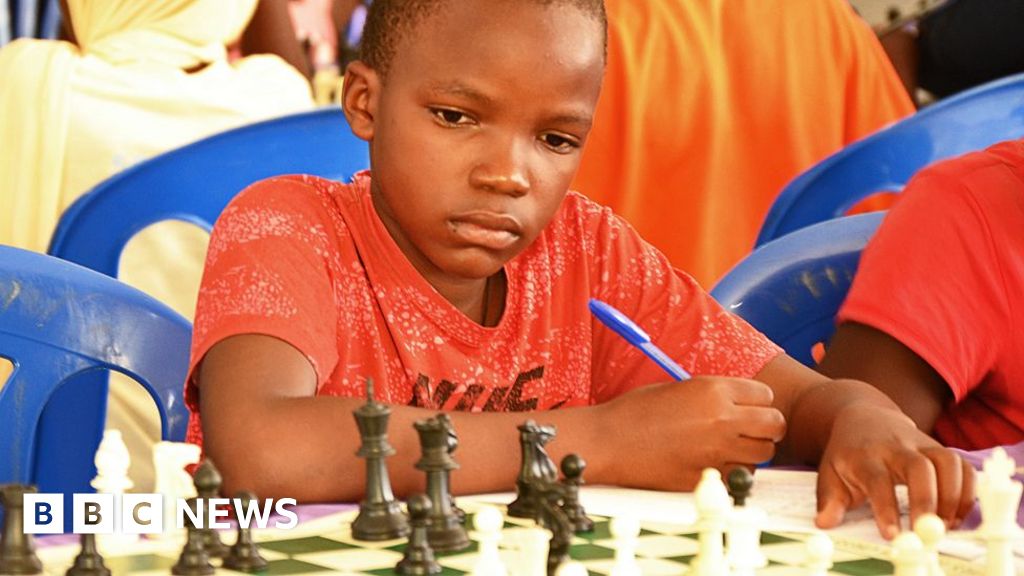Queen of Katwe's gambit still in play for Uganda's slum chess players

Uganda's 'Queen of Katwe' Chess Programme Faces Financial Hurdles Despite Hollywood Fame
Kampala, Uganda - A chess academy in Katwe, a Kampala slum, that inspired the acclaimed film "Queen of Katwe" continues to nurture young talents, but is grappling with financial constraints that threaten its future. Founded by Robert Katende, the SomChess Academy uses chess as a tool for education and empowerment, but struggles to maintain its operations following a drop in funding since the Covid-19 pandemic.
Chess as a Catalyst for Change
Robert Katende, whose character was portrayed in the Disney film, began his work in Katwe in 2004 with a single chessboard. He envisioned chess as more than just a game. "We use chess as a teaching tool, to identify the potential of the learners and guide them to their destiny," Katende told the BBC. Over the past two decades, his programmes have reached over 4,000 children, providing them with critical thinking skills and opportunities for personal growth.
The academy gained international recognition through the story of Phiona Mutesi, a school dropout who rose to become a chess prodigy. Her journey, chronicled in the book and subsequent film, highlighted the transformative power of chess and Katende's dedication. Mutesi's achievements, including multiple national titles and participation in international Olympiads, served as an inspiration for countless others in Katwe.
Impact on Young Lives
Patricia Kawuma, an 18-year-old two-time national junior chess champion, is among those who have benefited from Katende's programme. "Apart from winning school scholarships, this game has taught me how to strategise and plan ahead, and it instils discipline and patience," she said. Kawuma's chess winnings have enabled her to pay for her education and support her siblings.
The programme’s success extends beyond the chessboard. Many former participants have gone on to become doctors, engineers, and lawyers, demonstrating the long-term impact of Katende's initiative. However, the academy's future is uncertain due to dwindling resources.
Disney's Impact and Subsequent Challenges
The "Queen of Katwe" film brought significant attention to Katende's work, attracting both local and international partners. Disney provided a one-time grant of $50,000, which enabled him to expand his chess club to prisons and slums in neighbouring countries. However, the film's financial performance has created unexpected challenges.
Katende claims that he and Mutesi were promised a significant share of the film's profits, but Disney reported a loss on the project. "The loss put me in a bad spot because people think that I have hidden some money," Katende explained. "Many people think I'm a wealthy Hollywood chess coach after the film but the hard truth is that we are yet to benefit from its profits."
Expert Perspective
According to Moses Kayongo, a Kampala-based development economist, the situation highlights a common issue in Africa: the sustainability of projects reliant on external funding. "While international attention and investment can provide a significant boost, it's crucial to establish local ownership and diversified funding streams to ensure long-term viability," he said. "The 'Queen of Katwe' story is inspiring, but it also underscores the need for more robust support systems for grassroots initiatives."
Current Struggles and Future Prospects
The Covid-19 pandemic has exacerbated the academy's financial woes. Many partners have withdrawn their support, forcing Katende to scale down operations and reduce staff. "Before Covid I had 14 staff, but now we have eight. I fear we might let go of more staff due to financial constraints," he said. The academy now struggles to provide enough chess boards for its thousands of players.
Jovan Kasozi, Uganda's current junior chess champion and a protégé of Katende, missed an international tournament due to lack of funds. Despite these challenges, Kasozi remains determined. "I'm not giving up on chess, the game stimulates my mind and it has made me to be very good at mathematics. It makes me think like a computer," he said.
Katende remains optimistic, hoping that Disney will eventually break even on the film and that profits will start flowing. He also continues to seek new partnerships and funding opportunities to sustain his mission of transforming lives through chess.
Historical Context
The story of the SomChess Academy resonates with a broader narrative of resilience and innovation in African communities facing socio-economic challenges. Throughout the continent, sports and educational initiatives are used as tools to empower young people and provide them with opportunities for a brighter future. The challenges faced by Katende's programme highlight the importance of sustainable development models that prioritize local resources and community involvement.
Originally sourced from: BBC News Africa
